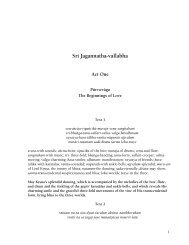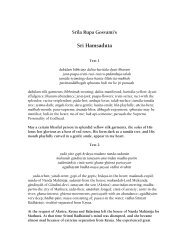Srimad Bhagavatam, Volume 3
Srimad Bhagavatam, Volume 3
Srimad Bhagavatam, Volume 3
You also want an ePaper? Increase the reach of your titles
YUMPU automatically turns print PDFs into web optimized ePapers that Google loves.
<strong>Srimad</strong> Bhagawatam, First Canto, <strong>Volume</strong> Three<br />
person dreaming and the person awake because actually there is no tiger: but<br />
the man forgetful of his awaken life is fearful where as the man who has not<br />
forgotten his position is not at all fearful of the socalled tiger. As such the<br />
members of Yadudynasty were fully awake in their service plan of the Lord<br />
and therefore they were awaken living beings and there was no tiger for them<br />
to be afraid of at any time. Even there was a real tiger the Lord was there to<br />
protect them by dint of His arms stretcher.<br />
Kacchit te anamayam tata bhrasta teja vibhasi me<br />
Alabdhamano avajnatah kim va tata chirositah.<br />
Kacchit—whether, Te—your, Anamayam—health is alright, Tata—my dear<br />
brother, Bhrasta—bereft of, Teja—lusture, Vihbasi—appear, Me—to me,<br />
Alabdhamano—without any respect, Avajnatah—neglected, Kim—whether,<br />
Va—or, Tata—my dear brother, Chirosito—on account long residence.<br />
My brother Arjuna please tell me if you are alright by your health? You<br />
appear to me lost of bodily lusture. Whether it is due to your disrespect<br />
or negligence by others due to your long stay at Dwarka?<br />
From all angles of vision Maharaj enquired from Arjuna about the welfare of<br />
Dwarka but he concluded at last that so long the Lord Sri Krishna Himself is<br />
there, nothing inauspicious could happen there. But at the same time Arjuna<br />
appeared to be bereft of his bodily lusture and thus he enquired about his<br />
personal welfare and asked so many vital questions.<br />
Kacchit abhihito abhavaih sabdadibhir amangatih<br />
Na dattam uktam arthibhya asaya yat pratisrutam<br />
Kacchit—whether, Abhihito—addresses by, Abhavaih—unfriendly,<br />
Sabdadibhir—by sounds, Amangalaih—inauspiciousness, Na—did not,<br />
Dattam—given in charity, Arthibhya—unto one who asked for, Asaya—with<br />
hope, Yat—what, Pratisrutam—promised to be paid.<br />
Whether somebody has addressed you with unfriendly sounds of<br />
inauspiciousness or you could not give in charity to one who asked for it<br />
or could not keep up your promise to an expectant receiver?<br />
A kshatriya royal order or a rich man is sometimes visited by persons who are<br />
in need of money. When they come for asking such donation it is the duty of<br />
the possessor of wealth to give in charity in consideration of the person place<br />
and time. If a Kshatriya or richman fails to comply with such obligation he<br />
must be very sorry for this discrepancy. Similarly one should not fail to keep<br />
up his promise of giving in charity. These discrepancies are sometimes causes<br />
of despondecy and thus failing person becomes subjected to criticism with<br />
unfriendly and inauspicious words which might be also the cause of Arjuna's<br />
plight.<br />
Kacchit twam brahmanam valam gam roginam striyam<br />
Saranopasitam sattwam na atyakshih saranapradah.<br />
Kacchit—whether, Twam—yourself, Brahmanam—the brahmins, Valam—<br />
the Child, Gam—the cow, Roginam—the deseased, Striyam—the woman,<br />
Saranopstitam—having approached for protection, Sattwam—any living<br />
being, Na—whether, Atyakshi—not given shelter, Saranapradah—deserving<br />
protection.<br />
You are always the protector of deserving living beings such as the<br />
brahmin, the child, the cow, the woman, the deseased or any other living<br />
being deserving to be protected. Could you not give such living beings<br />
protection even though approached for shelter?<br />
The Brahmin who are always engaged in researching knowledge for the<br />
society's welfare work both materially and spiritually deserve the protection of<br />
the king in all respects. Similarlly the children of the state, the cow, the<br />
deseased person, the woman and the old man specifically require the<br />
protection of the state or Kshatriya King. If such deserving living beings do<br />
not get protection by the Kshatriya or the royal order or by the state it is<br />
certainly shameful for such degraded Kshartya or the state. Maharaj<br />
Yudhisther was anxious to know about this discrepancy on the part of Arjuna<br />
if such things had actually happened.<br />
Kacchit twam na agamah agamyam gamyam va asatkritam striyam<br />
Parajito va atha bhavan na uttamai na samayih pathi<br />
Kacchit—whether, Twam—yourself, na—not agamah—did contact,<br />
Agayam—impeachable, Gamyam—acceptable, Va—either, Asatkritam—<br />
improperly treated, Striyam—a woman, Parajito—defeated by, Va—either,<br />
Atha—after all, Bhavan—your goodself na—not, Uttamai—by superior<br />
power, Na—neither, Samayi—by equals, Pathi—on the road.<br />
"lf you have had contacted any woman of impeachable character or have<br />
you not properly have treated a woman deserving contact? Or have you<br />
not had been defeated on the way by some one who is either inferior than<br />
you or equal with you?"<br />
It appears from this verse that during the time of the Pandavas free contact of<br />
man and woman was allowed on certain conditions only. The higher castes<br />
men namely the Brahmins, Kshatriyas could accept a woman of the Vaishyas<br />
and the Sudras community but a man from the lower castes could not contact<br />
20<br />
a woman of the higher caste. Even a Kshatriya could not contact a woman of<br />
the Brahmin caste. The wife of a Brahmin is considered one of the seven<br />
mothers namely own mother, wife of the spiritual master or teacher, the wife a<br />
Brahmin, the wife of the king, the cow, the nurse and earth. Such contact of<br />
man and woman was known Uttam and Adhama. Contact of the Brahmin with<br />
a Kshatriya woman is Uttama but the contact of a Kshatriya with the woman<br />
of a Brahmin is Adhama and therefore condemned. A woman approaching a<br />
man for contact should never be refused but at the same time the discretion as<br />
above mentioned may also be considered. Bhima was approached by one<br />
woman Hirimbi from the community of lower than the Sudras and Yayati<br />
refused to marry the Daughter of Sukracharya because of his becoming a<br />
Brahmin. Vyasdeva a Brahmin was called to beget Pandu and Dhritaastra.<br />
Sayavati belonged to the family of fisherman but Parasara a great Brahmin<br />
begot in her Vyasadeva. So there are so many examples of such contacts of<br />
woman but in all cases the contacts were not abominable neither the result of<br />
such contacts were bad. Free love or contact of man and woman is natural but<br />
that also must be carried out under regulated principles so that social<br />
consecration may not be disturbed neither unwanted worthlese population<br />
may be increased for unrest of the world.<br />
It is abominable for a Kshatriya to be defeated by one who is inferior in<br />
strength or equal in strength. If one is defeated at all he may be defeated by<br />
some superior power. Arjuna was defeated by Bhismadeva and Lord Krishna<br />
saved him from the danger. This was not insult for Arjuna because<br />
Bhismadeva was far superior than Arjuna in all respects namely age, respect<br />
and strength. But Karna was equal with Arjuna and therefore Arjuna was in<br />
crisis in fighting with Karnna. It was felt by Arjuna and therefore Karna was<br />
killed even by crooked means. Such are the engagements of the Kshatriyas<br />
and Maharaj Yudhisthir enquired from his brother if anything undesirable<br />
have had happened on the way back to home from Dwarka.<br />
Api swit parya bhunkthas twam<br />
Sambhojyan briddha valakan.<br />
Jugupsitam karma kimchit<br />
Kritavan na yad akshamam.<br />
Apiswit—if it were so that, Parya—by leaving aside, Bhunkthas—have dined,<br />
Twam—yourself, Sambhojyan—deserving to dine together, Briddha—the<br />
oldmen, Valakan—boys, Jugupsitam—abominable, Karma—action,<br />
Kimchit—Something, Kritavan—you must have had done, Na—not, Yad—<br />
that which, Akshyamam—unpardonable.<br />
Is it not so that you had had not taken care of old men and boys who<br />
deserve to dine with you together but you had left them and taken your<br />
meals alone ? If you had had not committed such unpardonable mistakes<br />
which are considered to be abominable actions.<br />
It is the duty of householder to feed first of all the children and old members<br />
of the family, the Brahmins and the invalids. Besides that an ideal<br />
householder is required to call for any unknown hungry man to come and dine<br />
before he himself goes to take his meals. He is required to call for such<br />
hungry man thrice on the road. Any mistake in such prescribed duty of<br />
householder specially in the matter of the oldmen and children is unpardonble.<br />
Kacchit presthatame natha hridayena atmabandhuna<br />
Sunya asmi rahito nityam manyase te anyatha na ruk.<br />
Kacchit—whether, Presthatame—unto the most dear one, Natha—my brother<br />
Arjuna, Hridayena—most intimate, Atmabandhuna—own friend Lord<br />
Krishna, Sunya—void, Asmi—I am, Rahito—having lost, Nityam—for all the<br />
time, Manyase—you think, Te—your, Anyatha—otherwise, Na—never,<br />
Ruk—distress of the mind.<br />
Is it not so that you are feeling yourself void for all the time being devoid<br />
of your most intimate freind Lord Krishna whom you might have lost oh<br />
my brother Arjuna? I do not find any other reason for your becoming so<br />
much dejected.<br />
All the inquisitiveness of Maharaj Yudhisthira about the world situattion were<br />
already conjectured by Maharaj Yudhisthira on the basis of Lord Krishna's<br />
disapearance from the vision of the world and this was now disclosed by him<br />
on account of acute dejection of Arjuna which could not have been possible<br />
without such untoward situation. So even though he was doubtful about it, he<br />
was obliged to enquire frankly about it form Arjuna on the basis of Sri<br />
Narada's indication.<br />
Thus end the Bhaktivedanta Purports of the First Canto Fourteenth Chapter in<br />
the matter of Disappearance of Lord Krishna.












